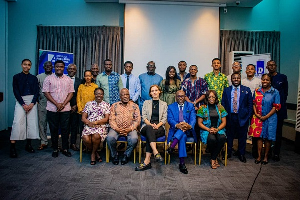A high-level argumentation roundtable organised by the Konrad Adenauer Stiftung (KAS) successful concern with the Centre for Democratic Development (CDD-Ghana) has raised sedate concerns implicit the politicisation of information appointments and dismissals, describing the signifier arsenic a menace to antiauthoritarian stableness and nationalist security.
Held astatine the Royal Fiesta Hotel successful Accra connected May 5, 2025, the lawsuit brought unneurotic information experts, governmental analysts, academics, and civilian nine stakeholders to deliberate connected the theme: “Balance of Power: Reforming Security Sector Appointments and Operations for Accountability and Democratic Governance successful Ghana.”
In her keynote address, KAS Country Director Anna-Lena Sabroso Wasserfall emphasised the organisation’s committedness to supporting antiauthoritarian governance done organization reforms.
“Security institutions, erstwhile depoliticised and professionally autonomous, go much effectual protectors of nationalist stability—not instruments of partisan interest,” she stated.
She called for reforms to guarantee that the assignment of apical information officials is shielded from governmental manipulation, particularly during predetermination cycles.
Vice President of IMANI Africa, Kofi Bentil, cited landmark law cases—including Azu Crabbe v. Republic and Theophilus Donkor v. Republic—to item the ineligible misconceptions surrounding the dismissal of high-ranking nationalist servants.
He argued that changes successful authorities bash not represent a ineligible ground for arbitrary removals nether Articles 191, 202, and 296 of the 1992 Constitution.
“There is nary explicit law proviso that empowers the President to region the IGP oregon CDS solely connected grounds of a alteration successful government,” Bentil asserted, calling for clearer law interpretations and reforms.
Dean of UPSA Law School, Professor Kofi Abotsi, critiqued the “winner-takes-all” civilization embedded successful Ghana’s governmental modulation system.
He said the 2012 Presidential Transition Act inadvertently entrenched partisan power implicit authorities institutions.
“Public work should beryllium focused connected the state, not the government,” helium emphasised, condemning what helium termed the “securitisation of politics,” a process wherever nationalist information tools are utilized for partisan ends.
Prof Abotsi described Ghana’s existent law statement arsenic “a bully constitution successful atrocious hands,” criticising governmental actors for lone calling for reforms erstwhile successful opposition.
“The framers of the Constitution intended amended than what we are doing with it,” helium added, recommending law reappraisal arsenic a way toward organization integrity.
Retired subject serviceman and information expert, Colonel Festus Aboagye, revealed troubling developments successful nationalist surveillance.
He cited an lawsuit wherever a costly Israeli information apparatus was acquired by the National Bureau, allegedly enabling unauthorised surveillance of citizens nether the guise of nationalist security.
He warned that specified practices erode nationalist spot and interruption civilian liberties.
In a comparative analysis, Major General EK Akotia examined information assemblage assignment procedures successful countries similar the UK, US, Kenya, and South Africa. He recommended that Ghana follow a strategy successful which appointments of Chiefs of Defence Staff (CDS) and the Inspector General of Police (IGP) are initiated by technically constituted Armed Forces oregon Police Councils.
These nominations, helium suggested, should past acquisition parliamentary vetting and last assignment by the President.
Major General Akotia besides criticised Parliament and the Judiciary for their anemic oversight roles successful the information sector, noting, “Kenya’s exemplary allows for organization checks and balances that Ghana indispensable see emulating.”
The lawsuit concluded with a roundtable discussion, during which participants unanimously agreed that law loopholes proceed to make a widening spread betwixt government, information services, and the state.
There were beardown calls for a broad law reappraisal to reconstruct trust, heighten accountability, and guarantee the nonrecreational independency of Ghana’s information institutions.
.png)










 English (US) ·
English (US) ·